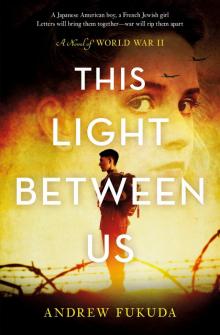- Home
- Andrew Fukuda
This Light Between Us Page 4
This Light Between Us Read online
Page 4
“Good, good.” Father throws on his jacket, opens the door. For a moment he’s silhouetted by the dawn sky, his breath fogging up before him. And then he casually steps out like it’s any other day, and the door closes behind him.
* * *
In the afternoon when Alex and Frank return home from school they spot Mother in the field. Something is wrong; even from a distance her distress is obvious. They drop their bags on the dirt path and sprint.
“Mother?” shouts Frank, panting hard. She’s on one of the raised beds, bent over a row of strawberries. “What are you doing?”
She doesn’t answer.
Alex gets there seconds later. “Are you okay, Mother?”
Slowly she straightens, turns to them. “Father is gone. And the fields, they need to be prepared—”
“What do you mean he’s gone?” Frank says. “Where’s Father?”
“They took him.”
“What?” The boys look at each other. “Who took him?”
She shakes her head. “Men in suits.” She scrunches her forehead, trying to remember. “F-B-I.”
“The FBI?” Frank says. “Where did they take him?”
“I don’t know.” Her voice is as unsteady as the legs she stands on. The boys lead her back into the house, one on either side of her. They sit her down at the kitchen table. Alex boils water, makes tea for her.
She tells them what happened, her voice quivering at first, then steadier as she draws strength from the concern of her boys. She speaks of how the agents came. How they forced him to leave right there and then. Didn’t even give him time to pack a small bag. Or say goodbye to her. They just led him to the car. And then the car left, taking him away. Will she ever see him again, are they shipping him back to Japan?
Frank gets up from the table. Starts making phone calls.
He hangs up a few minutes later. He’s called five of his Nisei friends. Two have a similar story: FBI agents took their fathers earlier that day. “No one knows where they were taken.” He sits down, his energy sapped.
“How can they just take Father?” Alex says, incredulous. He looks at Father’s chair at the dining table. Father, gone. His presence ripped away, leaving a gaping black hole in the universe. “Frank? How can they do that? Just snatch him away like a common criminal.”
“I don’t know.” His face is pale with shock, flushed at the cheeks with anger.
“How can they just—”
“I don’t know!”
“But where—”
“I said I don’t know!” He suddenly stands up, sending the chair flying backward and into the cabinet. He walks over to the window, presses his forehead against the glass. As if searching for Father somewhere far off in the distance.
Alex has never seen Frank so unsettled. And it’s at this moment that he realizes things aren’t going to be fine, that things are only just beginning to unravel. Because Frank—his lips trembling, his eyes squeezed shut—isn’t reassuring them with his aw-shucks grin, isn’t waving off their worries with a joke.
After a minute, Frank leans down to pick up the fallen chair from the floor. “Kyle and Pete,” he says to Mother in a somber voice that seems too old. “They both said their homes were searched. The FBI took away anything that looked Japanese. Anything that might suggest they’re Japanese spies.”
“Spies?” Alex says. “Sato-san and Muramoto-san, spies? That’s crazy.”
Frank runs a hand through his crew cut. “Did they search our home, Mother?”
She shakes her head.
“They might come back later.” Frank looks around. “We need to destroy everything Japanese. Any books, clothes, anything with kanji.”
“Are you sure?” Mother glances worriedly around the kitchen.
Frank nods grimly. “If they come and find Japanese stuff here, it’ll only hurt Father. We need to throw it all away.”
For the next few hours, they throw into a pile outside anything remotely Japanese: ceramic rice bowls, chopsticks, novels, kimonos, Hinamatsuri and Tango no Sekku dolls, phonographs by Noriko Awaya, old photo albums, Mother’s favorite kintsugi ceramic cups and bowls, calendars with prints of Utagawa Hiroshige’s work.
Finally, they pour gasoline over the pile. Frank strikes a match, flicks it into the pile. At first, only black smoke curls out in thin wisps, and a crackling sound—not unlike the static of a phonograph—scratches out. Then the bonfire suddenly roars to life. Dancing flames lick higher and higher until after a few minutes the boys are forced to retreat a few steps.
Mother walks back into the house. Alex figures she’s seen enough; she has no desire to see her past burned into ashes. But she returns less than a minute later. She is carrying a shoebox. The one containing all of Grandma’s old letters.
“Maybe we can just hide that,” Alex says. “Bury it somewhere. When Father comes home—”
Mother throws it in. The box flips over, upending its contents. Letters and envelopes and postcards and aerograms spill out. The fire comes after them quickly, possessively, lapping them all up. The letters curl in the heat, their edges glowing and fire-lit, then taken whole, devoured. Two minutes later, and there’s nothing left. Decades of thoughts and hopes and feelings turned to ashes, forever disappeared.
6
* * *
24 December 1941
Dear Alex,
I began this letter three times, but ended up tossing each away. It is so hard to find the right words.
Alex, I am so sorry about your father. I cannot imagine the pain you are in. Even though your words were few, I sensed you are hurting very deeply. I wish I can be there with you. This is one of the times when I feel so much the 8,000 kilometers that separate us.
I worry that you have no friends to talk to. I have been telling you for years now to make friends! But you haven’t listened, have you? MAKE FRIENDS, ALEX!!! And no, I don’t count even though we are really good friends, maybe even best friends. You need friends who are there with you on Bainbridge Island! And do not give me such nonsense about how books-are-my-friends and my-drawings-are-my-friends. They don’t count! They’re not human! And this is coming from someone who loves books, who wants to be an author when she grows up! You need actual living, breathing people around you! And no, your dog doesn’t count, either!
Oh, I should stop now before I work myself into more anger, and say something I will later regret.
Charlie
* * *
25 December 1941
Dear Alex,
I feel bad. I should not have yelled at you in my last letter. You are going through so much, and your only friend in the world is screaming at you. I remember all those times when my world was falling apart. When my cat died, or my English nanny returned to London, or my boyfriend Pierre decided to stop seeing me (how silly that seems now!). You were such a good friend, writing lots of letters, sending me a new Jane Eyre book, and drawing lots of funny cartoons. You were so thoughtful and kind. You did not yell at me.
I will not make excuses but recently I have been angry. I am not angry about the lack of food or coal or dairy things like milk, eggs—everyone has to deal with rations (except the Nazi doryphores, of course, they still get everything).
But I am angry at the unfair things. All the nonsense I face because of who I am. Because I am Jewish. Our radios and bicycles taken away. Our phone lines turned off. We can’t use public street phones, can’t enter parks or theaters or swimming pools or music halls or cafés, can’t borrow books from libraries. Can’t even cross the Champs-Élysées.
All these stupid rules simply because we are Jewish.
When I think about it too long I get so angry! And sometimes the anger spills over and hurts the people closest to me. Like you. I should hit instead at the Nazis walking around like peacocks on our streets, I should spit in their proud faces. Instead I say angry things to my best friend halfway across the earth who is going through a similar nightmare.
Sorry.
Yelling at you is especially stupid because you are my only friend now. I am serious! Even more of my Jewish friends have left Paris, to secret places in the south, or maybe to another country. So I can not even write to them. Only Hélène and Ruth are still here but they’re leaving soon too.
They tell me I must leave. But I will not ever leave Paris. This is my beautiful home, my La Ville Lumière. I think everyone is overreacting. When the Germans invaded France last year, everyone fled Paris in a panic. Then they returned a few weeks later, red-faced, needing to take down the shutters from their apartment windows. And now they are doing it again: overreacting. Just watch. Eventually, after the dust has settled, my Jewish friends will return.
But for now I am alone. And I think maybe this is why recently I feel so close to you (despite how I scream at you!). Even though we are so different—you are a shy American strawberry farmer, and I am an extroverted, (sometimes) bratty Paris girl—we somehow understand each other so well.
Oh Alex, sometimes I wish for a magic door. A door that connects my room in Paris to your room on Bainbridge Island. We could see each other so easily. Just open the door, and voilà, hello there! (Oh! Maybe this is not such a good idea! Promise you must knock first!) But with such a door, we do not have to wait weeks for a reply letter.
But this makes me wonder about something. Do you ever worry if we did meet in person, we might find that we do not like each other? Maybe we only like—how to say in English—idéals of each other? Maybe in real life we are quite different?
Oh, my thoughts get so deep and negative when I am all alone! Does this happen a lot to you, my lonely turtle boy? Do you find yourself thinking strange, depressing thoughts?
Your fellow lonely turtle,
Charlie
* * *
January 16, 1942
Dear Charlie,
Still no word from my father. My mother waits for the mailman every day, and every day she’s disappointed. Without my father, it’s like she’s lost substance. I’d never have guessed she needed him so much. The house is so empty and quiet now. At mealtimes my father’s empty chair seems to loom over us.
You’re right: I don’t have anyone to talk to. Not even Frank, anymore. Ever since our father was taken away, he’s changed. It really bothers him that someone could just be snatched away. He’s careful at school to hide it, and he’s the same old upbeat varsity captain, popular as heck. But at home, wow, complete turnaround, he turns really gloomy. Total Jekyll and Hyde.
Doesn’t help that he’s got even more chores to do with our father gone. So he’s tired all the time. I know he feels the pressure to be the man of the house now.
But I’m fine. Even without Frank, I’m doing okay. Because I honestly don’t need people. Give me a comic book, and I’m perfectly content. Or better yet, a sketchbook and an HB (or Eberhard Faber!) pencil. But put me in front of an actual person, and I tend to shrivel up. I never quite know what to say.
I’ve actually been thinking about the 5,000 miles that separate us. As much as we both hate the distance, it might ironically be the reason why we’ve become so close. It’s allowed me to be completely open and honest with you, something I can’t be when face-to-face with people.
Don’t worry about me, Charlie. As long as I got you, I’m fine.
Alex
P.S. Put to rest your silly notion that in real life we might not get along. That’s crazy, Charlie, that’s a really negative and weird and depressing thought! As you always tell me: MAKE SOME FRIENDS!!!!
7
JANUARY 17, 1942
They return weeks later. Four FBI agents. They don’t bother flashing their badges or asking for permission to enter. They tromp in with their boots, kicking aside the shoes and sandals neatly lined up in the genkan. Within minutes, they’ve tracked in more sand and dust and dirt than has ever been brought into the house.
“Someone shut that damn dog up,” one of them says.
“His name’s Hero, by the way,” Frank says, arms folded. He’s standing against the kitchen wall, still in his football uniform.
“What did you say?”
“I said the dog has a name. Hero.”
The agent cocks his head. “As in Hirohito? Figures. Got anything else from the Jap emperor in this house?”
The agent wants to provoke. Frank presses his lips together, looks away. The agent sniffs, moves to the bookshelf by the faded chintz couch. His fingers hook into book spines; he pulls them out, flips through them one by one, letting them drop to the floor when he’s done.
From the coffee table, he picks up a thick book, its leather cover worn and distressed, its thin pages crinkled and well thumbed. “Well, well, what do we have here?” He holds the book out to them, upside down, the opened pages printed with kanji. “What’s this?”
Frank looks at him with a sneer. “It’s called the Bible. Know it?”
“That so?”
“Yeah, you should read it sometime. Might learn a thing or two.”
The agent returns Frank’s stare, then turns to Mother. “You got any more books written in Japanese?”
“No.” She shakes her head vigorously. “No more Japanese book.”
“‘No more Japanese book,’” the agent intones, mimicking her accent.
Alex can hear the other three agents moving about the house. Sounds of drawers being opened, clothes thrown to the floor, bed mattresses lifted and dropped.
“Do you recognize any of these agents?” he asks Mother. “From when Father was taken away?”
She shakes her head. “These white men,” she whispers, “they all look the same.”
“No talking in Japanese,” the agent barks at them.
“We’re talking, is all,” Frank says, pushing off the wall. “What’s it to you?”
“Okay,” Mother says, putting a hand on Frank. “Okay. No Japanese.”
The agent snorts. His eyes settle on something on the other side of the kitchen, and he moves eagerly to it. He pulls out a sack of rice from beneath the sink.
“That’s a lot of lice. Sorry, I mean rice.” He sticks his hands into the sack, running his hand through the grains. He draws out two fistfuls, lets the rice sift through his fingers. “We’ve found all kinds of contraband in your lice in other homes.” He suddenly grabs the sack, upending it. The grains of rice go scattering across the floor.
“Come on, now!” Frank takes a step toward the agent.
“Don’t!” the agent warns, straightening.
“Why’d you do that? It’s just rice.”
“I said back off!”
“Yeah, you go to hell—”
Mother stands. “Daisuke!”
The agent spins around. “I said don’t speak in Japanese!” His pointed finger almost jabs her nose.
Frank steps forward, his hands balled into fists.
Do it, Frank, Alex thinks. Swing a haymaker. Give that idiot a shiner.
“Daisuke!” Mother shouts at Frank, clapping her hands sharply. Frank pauses, breathing hard.
Another agent enters into the kitchen, his eyes swinging between Frank and the other agent. “What’s going on here?”
“Nothing,” the agent answers, shrugging.
Mother sits down, her fingers trembling.
The other agents return from the other rooms. They’re carrying a Japanese vase, a camera, a pair of binoculars, even a wire clothes hanger. “Contraband,” one of them mumbles. They walk out, stepping over the scattered rice.
“Hey, wait!” Alex says after them. This is his chance to find out about Father. “When’s my father coming back?”
They ignore him, walk out the front door.
Frank follows them outside. “Hey! Didn’t you hear my brother? He asked when you’re releasing our father!”
They ignore him as they saunter toward their car.
“Don’t even think about leaving until you answer me!” Frank shouts, and now he is stomping across the porch, now he is leaping off the stairs, his ba
re feet striking the frozen ground. The agents pile into the car. Mother cries out after him, telling him not to do anything stupid, to just let them go. But Frank doesn’t stop.
Alex pushes open the screen door. “Frank! It’s okay, just forget it!”
But Frank ignores him. He runs right up to the government car, and stands directly before it as the engine roars awake. He stares through the windshield at the four agents inside; they stare back, one of them grinning, the others glaring. The driver, his lips twisted in a sneer, leans on the horn. Frank doesn’t budge. The car suddenly lunges forward—Mother screams—and although Frank flinches, he holds his ground.
“When’s my father coming back?” he shouts, his voice almost a screech. “Tell me!”
“Frank!” shouts Alex, running toward him.
The car lurches forward again, stopping mere inches from Frank.
Still he stands his ground. “Get out the car and tell me! When’s he coming home?” He raises his hands, and slams them down onto the hood of the car.
“Daisuke!” Mother screams from the porch.
The driver’s door opens. “Listen, kid, get the hell out of the way before I arrest your ass.”
Frank raises his fists, about to strike the hood again.
Alex grabs hold of Frank’s shirt from behind. “Frank,” he says urgently, trying to tug him backward. “Please stop!”
But Frank is unmovable. Alex can feels his hard muscles bunching under his clothing, readying to unleash.
Mother hurries over. Doesn’t try to physically pull him away, knowing better. “Daisuke,” she says. “You can get us into trouble. And then they’ll send Father off. Far away. Maybe back to Japan. Stop this.”
Frank stares at her, his chest rising and falling. His jawline jutting out. He closes his eyes, shakes his head.
“That’s right, punk,” the agent says. “Listen to your mommy. Whatever she said.” He gets back into the car. Guns the engine, the tires spinning and kicking dirt into their faces.

 The Hunt
The Hunt The Trap
The Trap The Prey
The Prey This Light Between Us
This Light Between Us